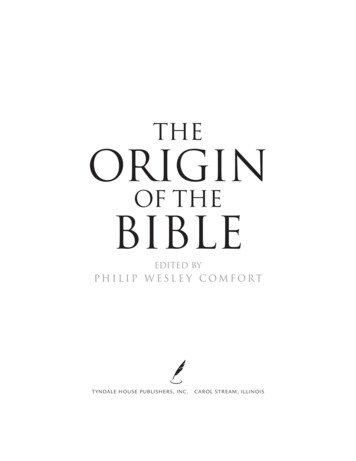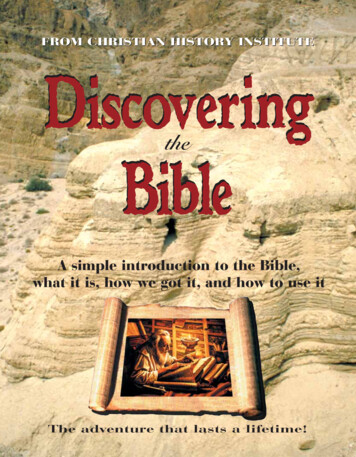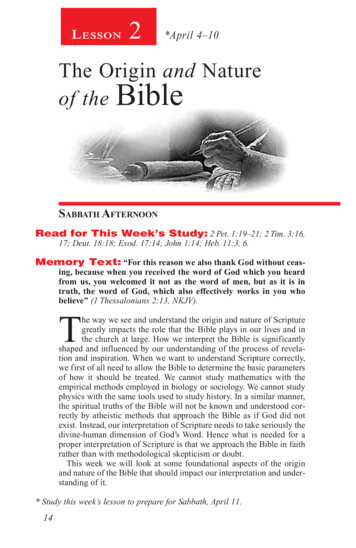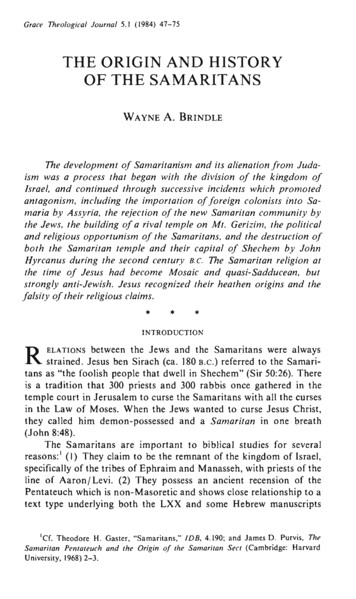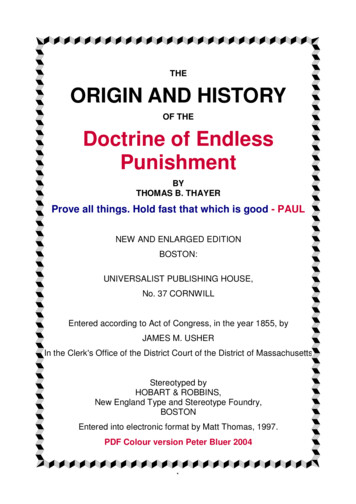
Transcription
THEORIGIN AND HISTORYOF THEDoctrine of EndlessPunishmentBYTHOMAS B. THAYERProve all things. Hold fast that which is good - PAULNEW AND ENLARGED EDITIONBOSTON:UNIVERSALIST PUBLISHING HOUSE,No. 37 CORNWILLEntered according to Act of Congress, in the year 1855, byJAMES M. USHERIn the Clerk's Office of the District Court of the District of MassachusettsStereotyped byHOBART & ROBBINS,New England Type and Stereotype Foundry,BOSTONEntered into electronic format by Matt Thomas, 1997.PDF Colour version Peter Bluer 20041
PREFACEThis little work is written for the purpose of furnishing a sketch of theargument by which it is shown that the doctrine of Endless Punishment isnot of divine origin, but traceable directly to a heathen source.It is not intended as an elaborately philosophical or critical discussion ofthe subject, as the size of the volume will show; but only as a popularpresentation of the method of proof, and of the leading facts andauthorities on which the argument rests.Those having time and sources of information at command, will enter intoa more thorough investigation for themselves. For such this work is notdesigned; but for those who, not having the opportunity, nor the books,necessary to a complete and critical examination of the question, wish abrief statement of the facts and arguments on which is grounded theassertion that the doctrine of endless torments is of heathen origin.This will account for the absence of many things which the reader mightjustly expect to find here, and which rightfully claim place in a workbearing the title of this.The subject treated is one of very great importance, and equally concernsthe purity of Christian doctrine, and the happiness and virtue of thosebelieving. It is every day commanding more and more attention fromserious and thoughtful minds.And on all sides, and in the churches of all sects, there is increasedinquiry into the foundations of the doctrine, and rapidly growing doubts ofits divine origin and authority. It is possible the following pages may helpto answer some of the questions growing out of this state of mind, and toshow how a doctrine, thoroughly heathen in origin and character, came tobe adopted by the Christian church.The sale of the first edition of nearly two thousand copies in the space ofthree or four months, without being advertised in any form, hasencouraged me to believe that the work meets an actual want, and will beserviceable to the cause of Truth.In the preparation of the present edition, therefore, I have madeconsiderable additions; and, I trust, improvements also, in the hope ofmaking it more worthy and more useful. Two chapters and two sectionsentire have been added, and chapters three, four and six, have beengreatly enlarged, and the argument illustrated and fortified by new factsand authorities.2
Still the book is far from what I could wish, or what it might be made, iftime, and all the means of investigation, were at command. Yet, such as itis, I send it forth again, to do what work it may; believing that, in theconflict of opinions, Truth only is immortal, and cheerfully confident,therefore, that, at last, all error and all evil will perish.Since the above was written, this work has passed through several largeeditions. The present issue has additional testimonies strengthening theargument in its various branches. Most of these, with the exception ofthose pertaining to Chapters III and IX., which are inserted in the body ofthe text, are gathered into a single chapter at the end of the book; and tofacilitate reference, notes have been added to the chapters and sectionsto which they severally belong.Boston, January, 1871.3
CONTENTS.CHAPTER I.THE PERIOD BEFORE THE LAW.No Law announced to our First Parents with the Penalty of EndlessPunishment annexedNot revealed in the History of their Transgression, nor in that of Cain, theDeluge, or Sodom and GomorrahCHAPTER II.THE PERIOD UNDER THE LAW.SECT. I. - Endless Punishment not taught by Moses in the Law; - nor is itmentioned anywhere in the BibleHistory of the JewsSECT. II. - Testimony of Orthodox Critics and Theologians to this PointSECT. III. - Old Testament Doctrine of Hell, SheolSECT. IV. - General Application of the ArgumentSECT. V. - Objections to the foregoing Argument answeredCHAPTER III.ENDLESS PUNISHMENT OF HEATHEN ORIGIN.SECT. I. - Description of the Heathen Hell, its Location, Inhabitants andPunishments; compared with Church DoctrineSECT. II. - The Doctrine Invented by Heathen Legislators and Poets;Shown by their own ConfessionIts Egyptian OriginCHAPTER IVTHE JEWS BORROWED THE DOCTRINE FROM THE HEATHENThe Historical Argument on this Point4
CHAPTER VENDLESS PUNISHMENT NOT TAUGHT IN THE NEW TESTAMENTSECT. I. - Salvation of Christ not from thisSECT. II. - New Testament Doctrine of HellSECT. III. - Unquenchable Fire; how used in the Scriptures; how used byGreek WritersSECT. IV. - Everlasting, Eternal, and Forever, not EndlessTestimony of Lexicographers and CriticsUsage of Greek AuthorsScripture UsageSECT. V. - The Second DeathCHAPTER VI.THE INTRODUCTION OF THE DOCTRINE INTO THE CHRISTIANCHURCH.The general Corruption of the early ChurchFirst Appearance of the Doctrine - its FormFirst, The Wicked not raised from the Dead, or Under-worldSecond, Raised and PunishedThird, Future Punishment ending in AnnihilationFourth, Endless PunishmentCondemnation of Universalism, and Endless Punishment decreedOrthodox, A.D. 553CHAPTER VII.THE DOCTRINE CREATES A CRUEL AND REVENGEFUL SPIRIT ILLUSTRATED FROM HISTORY.Influence of Faith on Character5
Tertullian's ExultationCatholic Crusades against the AlbigensesMassacre of St. BartholomewThe Catholic InquisitionThe Spanish Inquisition; its Influence on Society; NoteThe Influence not confined to Catholic Believers of the DoctrineCHAPTER VIII.THE COMPARATIVE MORAL INFLUENCE OF BELIEF AND DISBELIEFOF ENDLESS PUNISHMENT - HISTORICAL CONTRAST.Its Influence on the Morals of the Heathen; Greeks, Romans, BurmansThe Character of the Pharisees and Sadducees contrasted in reference tothis PointCHAPTER IX.THE INFLUENCE OF THE DOCTRINE ON THE HAPPINESS OF ITSBELIEVERS - ILLUSTRATED FROM THEIR OWN CONFESSIONS.Testimony of Saurin, Stuart, Barnes, Henry Ward BeecherCHAPTER X.ADDITIONAL TESTIMONIES ON THE QUESTIONS DISCUSSED IN THEPRECEDING CHAPTERS.THE ORIGIN AND HISTORY OF THEDOCTRINE OF ENDLESS PUNISHMENT6
THE ORIGIN AND HISTORY OF ENDLESS PUNISHMENTChapter 1CHAPTER I.THE PERIOD BEFORE THE LAW.The following two positions will be admitted without question, it is believed,by all Christians.1st. If the doctrine of endless punishment be, as affirmed by its believers,absolutely and indispensably necessary to the preservation of virtue, andto perfect obedience to the laws of God; if this be the salutary and savinginfluence of the doctrine, then it constitutes one of the strongest possiblereasons for its being revealed to man at the very earliest period of theworld's history.2d. If endless punishment be true, it is terribly true to all those who are indanger, - wherein is found another powerful reason why it should havebeen made known in the clearest manner, on the very morning of creation!In the clearest manner: it should not have been left in doubt, andobscurity, by the use of indefinite terms; but it should have beenproclaimed in language which no man could misunderstand, if he would.Rather than that there should even be the possibility of a mistake in amatter of such vast and fearful moment, it should have been graven byspecial miracle into every soul that God sent into the world.Let us, then, proceed to inquire if we have any such revelation of thedoctrine. When God created Adam and Eve, and placed them in thegarden of Eden, did He announce to them any law for their observance,having attached to it the penalty in question ? Surely justice demanded, ifHe had forced them into being subject to this awful peril, that He shouldset out before them both the law and its punishment in the most specificmanner. Did He do this ? Where is the record of it ? Read diligently thefirst and second chapters of Genesis, and see if anything of this sort isrecorded there, in connection with the creation of man.In chapter 2.15-17, we have this statement: "And the Lord God took theman, and put him into the garden of Eden to dress it and keep it. And theLord God commanded the man, saying, Of every tree of the garden thoumayest freely eat, but of the tree of the knowledge of good and evil, thoushalt not eat of it: for in the day that thou eatest thereof thou shalt surelydie."This is the only record we have bearing on the subject; but there is nomoral law here, which is declared as the future rule of life for them, and forall their posterity. They are simply commanded not to eat of the forbiddentree. Now, whether this is understood in a literal or allegorical sense, wecannot suppose that we have here the formal announcement of a divine7
THE ORIGIN AND HISTORY OF ENDLESS PUNISHMENTChapter 1law, which claimed the obedience of all mankind on the penalty of endlesstorment. We certainly cannot believe that God would open the greatdrama of our life on this earth, involving such infinite consequences, insuch brief and doubtful language, and with so little specification where somuch was needed.As regards the penalty of disobeying the commandment, do we find anystatement which can be mistaken for endless punishment ? God says, "Inthe day thou eatest thereof thou shalt surely die;" but this is very far fromsaying, "Thou shalt, after the death of the body, be subjected to thetorments of an endless hell."We are told, to be sure, that this means "death temporal, deathspiritual, and death eternal;" but where is the proof of it ? So terrible adoctrine must not be assumed, but demonstrated by unquestionableevidence. Who can believe that God would reveal so frightful apunishment in language so easily misunderstood - by the single word"die," a term employed in such a variety of senses, capable of such awide latitude of usage ?Would any earthly parent, if the immortal salvation of his childrenwere at stake, have been so careless of his speech ? Would he havechosen language so liable to be mistaken ? Would he not rather haveannounced the awful truth in words which would admit of nopossible doubt ? Beside, if the terrors of this punishment are so effectualin preventing transgression, this was another reason for a specificdeclaration of the consequences of disobedience. If the argument on thispoint is good, a plain, open threat of endless woe at the very gate of Eden,as they entered, might have kept them back from the forbidden tree, andsaved them and our race from the dreadful evils which followed theintroduction of sin into the world.But let us now turn to the record of their transgression, and of some otherexamples, where, if the doctrine is of divine origin and authority, we maysurely expect to find it announced, and the weight of its awful cursebrought down upon the guilty victims.1. The first transgression. Gen 3.1-16. As this is the beginning of thesorrowful tragedy of evil, we may look for some distinct revelation of thedoctrine in review, if it is of God; yet not one word is said in reference toit, nor is there any threat of punishment that can be mistaken for it !The serpent is cursed, and the ground is cursed; but neither the man northe woman ! And observe carefully all the words of the sentence, andwhile mention is made of evils to be endured in this life, not the mostdistant allusion is made to any evil or punishment beyond this life.8
THE ORIGIN AND HISTORY OF ENDLESS PUNISHMENTChapter 1Now, if the doctrine of interminable torment after death be true, how arewe to account for this ? Can it be possible that God would be so careful tomention all the lesser evils, and wholly omit all mention of the terriblewoes that are to have no end ? Who can believe that a just lawgiver andruler would deal thus with his people ? And of all things who can believethat the divine Father would deal thus treacherously with His ownchildren ?But how differently the case stands, when we come to the doctrine of apresent retribution for sin. In the very outset God warns our first parentsagainst transgression, and in the most positive terms declares to Adam,"In the day thou eatest thereof thou shalt surely die." Is not this clearenough ? In the very day of transgression they should die, or suffer thepunishment of their sin, and this surely, beyond question or doubt. Andwas this assurance of God fulfilled ? Most certainly; for they had nosooner sinned, than the retribution began, and they died to the peace andjoy of innocence. The day of transgression was the day of judgment. Theyfound that the wages of sin were death, or, in other words, misery, fear,anguish, and all the direful consequences of wrong. And that their casemay profit their posterity, a careful statement of the mournfulconsequences of the transgression is made up, and put on record as awarning to future generations.2. Cain; or the murder of Abel. Gen 4.1-16. Here we have an exampleof the greatest of all crimes, murder - the murder of a brother ! Surelywe may now expect the doctrine of endless punishment to berevealed; and it would seem that, if true, there is no possible way toavoid mention of it. This was the first instance of this awful crime, and,Cain standing exposed to the fearful penalty, this was the time to roll thethunder of its terrors through the world, as a warning to all cominggenerations ! This must have been done, if true; and yet in the wholeaccount we have not a single word on the subject, not the slightestintimation that any such punishment was threatened.The whole record is as follows: "And the Lord said unto Cain, The voice ofthy brother's blood crieth unto me from the ground! And now art thou cursedfrom the earth, which hath opened her mouth to receive thy brother's bloodfrom thy hand. When thou tillest the ground, it shall not henceforth yieldunto thee her strength; a fugitive and a vagabond shalt thou be in the earth."This is all we have in the way of punishment or threatenings; and is thereanything here that looks like endless torments beyond this life ? anythingthat would suggest the idea of such a judgment? Nothing at all; the guiltyman is cursed from the earth, which is to refuse her fruits to his culture,and is driven out a vagabond; and there is the end of the account.9
THE ORIGIN AND HISTORY OF ENDLESS PUNISHMENTChapter 1And it is evident that Cain did not understand the threats of judgment asimplying endless woe, for his fears are all confined to the earth - the dreadof revenge, of being killed, and the horrors of the life of an outcast and avagabond. "And Cain said unto the Lord, My punishment is greater than Ican bear. Behold, thou hast driven me out this day from the face of the earth;and from thy face shall I be hid; and I shall be a fugitive and a vagabond inthe earth; and it shall come to pass that every one who findeth me shall slayme." These are all the evils of which Cain makes mention; and in view ofthem he exclaims, "My punishment is greater than I can bear."Now, we put the question, can it be that, beside the punishments herenamed, Cain was to be subjected to endless torments after death, and yetbe left wholly ignorant of the dreadful fate that awaited him ? And if theguilty and wretched man thought the punishment actually denouncedgreater than he could bear, what would he have said, if, in addition tothis, there had been threatened the agonies of an endless hell ?And is it possible to believe, if this was the purpose of God, that He wouldbe wholly silent in regard to it ? Was it right to be silent, if the terrible fateof Cain could have served as a warning and a restraint to all who shouldcome after him ?In verse 15, "Therefore, whosoever slayeth Cain, vengeance shall be takenon him seven-fold." If infinite, endless torment is the punishment of Cain,how can seven-fold more than this be inflicted on another ? Yet so it iswritten, and, therefore, either Cain's punishment was not endless woe, orthere can be such a thing as seven-fold endless woe!3. The deluge, or the destruction of the old world. Gen 6 - 8 Here wehave one of the most remarkable examples of wickedness and judgmentrecorded in the Bible; and if ever anything is to be said on the subject ofendless punishment, we may look for it here with the certainty of finding it.The description of the exceeding wickedness of the people who weredestroyed in the flood may be seen in verses 5, 11, and 13, of chapter 6The heart was given to evil, and "only evil continually;" "the earth was filledwith violence, and all flesh had corrupted his way upon the earth." Here,then, was precisely the time, here the circumstances, which required therevelation and preaching of endless punishment, if, as affirmed, itsinfluence is retaining and saving. This was the occasion, of all others, tomake it known, that, through its terrifying and subduing power, thedepraved and corrupted people might be turned from their sins, and theworld thereby saved from the overwhelming horrors of the flood. And yethere, too, not one word is said on the subject in the whole account. Noah,who was "a preacher of righteousness," was not a preacher of endlesspunishment. No mention is made of his ever having breathed asyllable in reference to it; nor is there a single line in the record of this10
THE ORIGIN AND HISTORY OF ENDLESS PUNISHMENTChapter 1event, showing that God threatened this, or that any attempt was made torestrain or reform the people through its influence. If the doctrine exertsthe favorable influence ascribed to it, did God do all He might have doneto reform and save them ?But again; in the account of their judgment we are told that they weredestroyed by the flood from the face of the earth, everything that hadbreath; and with this the record closes. Gen 6.11-17; 7.10-24. Now if, asasserted, they were not only destroyed by the flood, but were afterwardssubjected to the tortures of the world of ceaseless woe, is it not passingstrange that no mention is made of this - not even an allusion to it ? Is itpossible that everything else should be carefully related, even to theheight of the waters above the mountains, and the number of days theyprevailed, and yet that the endless and indescribable torments of hell, themost terrible part of the judgment, and the most important to the world andto us, should be wholly omitted, and that without one word ofexplanation ?4. Destruction of Sodom and Gomorrah. Gen 18,19. Here we haveanother instance of remarkable wickedness, and of terrible judgment. Yet,on examination, we find no warning given to the Sodomites of anendless fire, to which the soul would be subjected, after the fire bywhich the body should perish. The extreme wickedness of the people isset forth with graphic power, in the scene described in chapter 18.23-33;and it would seem a proper occasion for a revelation of endlesspunishment, if true; for such, if any, must certainly be its victims. But if weturn to the record, chapter 19.24,25, we find it contains no hint of thematter, neither in the way of warning to the Sodomites, nor of history forrestraining future transgressors. If true, how is this omission to beexplained in harmony with the acknowledged principles of justice, to saynothing of mercy ?What would we say of a ruler who should publish a law, affixing to it thepenalty of ten stripes for every transgression; and then, having inflictedthis, should proceed to burn the offender over a slow fire, till he sankunder the torture and died ? And what should we think, if, with devilishingenuity, he should contrive to keep every one of his victims alive for awhole year, for ten years, in order that the slow torture might belengthened out that time; and all this kept secret when the law waspublished, and the trivial penalty of ten stripes declared as thepunishment ? Yet this is precisely the state of the case in the judgmentunder review, if the Sodomites were sent into endless torments.The difficulty is not removed by reference to Jude 7. For, in the first place,the expression, "suffering the vengeance of eternal (aioniou), fire," does11
THE ORIGIN AND HISTORY OF ENDLESS PUNISHMENTChapter 1not establish the point of endless suffering, - "eternal" fire andendless fire being two things, quite distinct from each other. Theoriginal word means simply indefinite time. In the second place, it issaid, they are "set forth as an EXAMPLE, suffering the vengeance," &c. Nowthe very argument is based on the fact, that the history of the overthrow ofSodom does not furnish an example of endless torment, since not oneword is said on the subject by Moses, from beginning to end of hisaccount ! Where, then, is the example ? Admitting the commoninterpretation of Jude to be correct, it is involved in inextricable difficulty;for,1st. It states a falsehood, since the Sodomites were not set forth as anexample of endless punishment in the invisible world, as no record of it isgiven by Moses, or the prophets, or any sacred writer.2nd. How is it that all mention of the matter should have been omitted untilthe time of Jude, and then be introduced, as it clearly is, incidentally, in theway of illustration? If there is any restraining power in the example, whywas it concealed from the world more than two thousand years ? Why wasnot the awful fate which awaited them revealed to the victims in the firstplace ? It might have saved them. Why did not the sacred historian giveaccount of it, that the millions who lived and perished between the eventand the time of Jude, might have had the benefit of the example ? If hewas inspired, did he not know it ? and if so, why was he silent ?But, as an example of divine judgment on the wicked here, in this world,visible to all future generations of men, the destruction of Sodom wasworthy of special note, and exactly to the point of Jude's argument. And itis under this light that it is seen by some of the best informed orthodoxcommentators.Benson, in his note on the place, says: "By their suffering the punishmentof eternal fire,” St. Jude did not mean that those wicked persons werethen, and would be always, burning in hell-fire. For he intimates that whatthey suffered was set forth to public view, and appeared to all as anexample, or specimen, of God's displeasure against vice. That fire whichconsumed Sodom, &c., might be called eternal, as it burned till it hadutterly consumed them, beyond the possibility of their ever beinginhabited, or rebuilt.Whitby's remarks are similar: "They are said to suffer the vengeance ofeternal fire, not because their souls are at present punished in hell-fire, butbecause they, and their cities, perished by that fire from heaven, whichbrought a perpetual and irreparable destruction on them. Nor is thereanything more common and familiar in Scripture, than to represent athorough and irreparable visitation, whose effects and signs should be still12
THE ORIGIN AND HISTORY OF ENDLESS PUNISHMENTChapter 1remaining, by the word aionios, which we here render eternal."Gilpin says: "The apostle cannot well mean future punishments, because hementions it as something that was to be a visible example to all." And othersto the same effect: - see Paige's Selections on the place.And thus we might follow out the inquiry in regard to every case ofexceeding wickedness, or of great crimes; and we should find a specificstatement, in every case, of the judgments inflicted on earth, up to thearticle of death, but the same marvellous silence in regard to the additionaljudgment of endless torment after death. We have accounts of theBuilders of Babel, Joseph's Brethren, the Destruction of Pharaoh and hisHost, Lot's Wife, &c., but not a word in any of these of any judgmentkindred to endless woe - not a word of any judgment after death. If thesesinners were given over, after suffering the punishments recorded in theBible, to infinitely greater punishments to be perpetuated without end, thenthe most studied concealment has been purposely maintained in regard tothe subject by the Scripture writers, or else they were as utterly ignorant ofthe whole matter as we are.But no conceivable reason can be imagined for concealing thistremendous fact, if it were a fact, but every reason for revealing andaffirming it to all the world. If they had known or believed anything of thesort, they could not have been silent. The only possible inference is,that the people before the Law certainly knew nothing about thedoctrine of endless torments after death. If true, it had not beenrevealed in the long period of two thousand five hundred years, from thecreation to the giving of the Law on Mount SinaI It is impossible to believethat, if true, God would have kept His children in the dark all this while;that no hint of it, no allusion to it, should have found place in His revelationto the Patriarchs; that He should never have threatened anythingbordering upon it, in such cases of extreme wickedness as that of Cain,the Sodomites, and the corrupt inhabitants of the old world.The just and inevitable conclusion then, is, that for twenty-five centuries,God had no design or thought of inflicting so dreadful an evil as endlesspunishment on His children. And, therefore, if we find it revealed in anysubsequent portion of the Bible, it will be evident that it is a purpose whichHe has formed since the Patriarchal period; that it was not a part of Hisoriginal plan of the world, but something which He has incorporated into itsince. The next step, therefore, in this inquiry, is to make examination ofthe Law records, in order to ascertain if we have any revelation of thedoctrine there.13
THE PERIOD UNDER THE LAWChapter 2CHAPTER II.THE PERIOD UNDER THE LAW.It is now quite extensively known and allowed, by believers in the doctrineof endless punishment, that it is not revealed nor recognized by the Law ofMoses. The facts in this regard are so palpable and conclusive to everydiligent student of the Bible, that it would be difficult to deny that theMosaic dispensation is altogether a dispensation of earthly rewards andpunishments; that its retributions follow promptly on the steps oftransgression. Both the records of the Law, and the history of the Jewishpeople through a period of fifteen hundred years, show this with adistinctness and fullness beyond all question, as we shall presently see.SECTION I. ARGUMENT FROM THE LAW ITSELF,AND FROM THE HISTORY OF THE JEWS.Let us first examine the remarkable statement of the question contained inDeuteronomy xxviii Space will allow me to quote only a few verses, but Iearnestly solicit the reader, before going any further, to take up the Bibleand carefully peruse the entire chapter, which is exceedingly important toour inquiry."It shall come to pass, if thou wilt not hearken unto the voice of the Lord thyGod, to observe to do all His commandments and statutes which I commandthee this day, that all these curses shall come upon thee, and overtake thee:Cursed shalt thou be in the city, and cursed shalt thou be in the field. Cursedshall be thy basket and thy store. Cursed shall be the fruit of thy body, andthe fruit of thy land, the increase of thy cattle, and the flocks of thy sheep.Cursed shalt thou be when thou comest in, and cursed shalt thou be whenthou goest out. The Lord shall send upon thee cursing, vexation and rebukein all that thou settest thine hand unto for to do. He shall smite thee withconsumption, and with a fever, with blasting and mildew; and the Lord shallmake the pestilence cleave unto thee, until he shall have consumed theefrom off the land whither thou goest to possess it.Moreover, all these curses shall come upon thee, and shall pursue thee tillthou be destroyed; because thou hearkenest not unto the voice of the Lordthy God, to keep his commandments and his statutes, which he commandedthee. Because thou servest not the Lord thy God with joyfulness, and withgladness of heart, for the abundance of all things, therefore shalt thou servethine enemies which the Lord shall send against thee, in hunger, and inthirst, and in nakedness, and in want of all things. And thine enemy shallbesiege thee in all thy gates, until thy high and fenced walls come down,wherein thou trustest. Thou shalt beget sons and daughters, but thou shaltnot enjoy them; for they shall go into captivity. And thou shalt become anastonishment, a proverb, and a byword, among all nations whither the Lordshall lead thee."14
THE PERIOD UNDER THE LAWChapter 2Now here, in this important document, we have set out at great length,and with every variety of specification, the judgments and punishmentswith which God threatens to visit the Jews for their transgressions of Hislaws; but not a word is uttered in respect to the punishments of anendless hell after death. All the evils which are to fall upon them are of atemporal character, such only as can be inflicted on them while in thebody, while on the earth: plagues and sickness, murrain on the cattle, andmildew on their vines and grains; locusts in the fields and orchards;hunger, thirst, and nakedness; curses on the city and country, curses athome and abroad; the desolation of their country by their enemies, exileand captivity.These are the only penalties annexed to the Law of Moses of which wehave any information; and these were fully visited on the heads of theoffending and rebellious people."There runs through their history a system of strict and retributive judgment,whereof the God of Jacob is the administrator. Within the pale of thispeculiar dispensation, virtue met its recompense, and vice its punishment,with a regularity that was at once unfailing and notorious. The nation ispresented to us under very different attitudes; under judges, under kings, inpeace and in war, victorious and vanquished, prosperous and afflicted, athome
its divine origin and authority. It is possible the following pages may help to answer some of the questions growing out of this state of mind, and to show how a doctrine, thoroughly heathen in origin and character, came to be adopted by the Christian church. The sale of the fi




